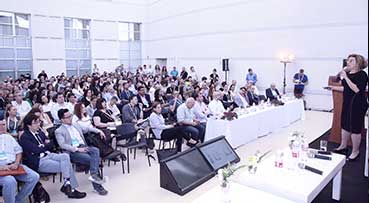Nine to Five is over. The nine to five job, where you were paid just to show up to work, which is really the definition of salaried employee, that model is slowly disappearing. Nine to five is now 24 * 7. And work is no longer where we go but what we do. The world of work is slowly moving towards flexible access to talent – what you need, when you need it, whoever is best, however you can get them. We’re still not sure what to call it: the Sharing Economy, Freelance Economy, Entrepreneurs and Infopreneurs. Yet common to all these emerging ways of work is the lack of employment stability.
Welcome to the world of work within the world of Business Unusual. In a world where the largest hotel has no bricks, a taxi company has no vehicles, where the newest cars will drive themselves and one of three jobs will be replaced by either software, a robot or a smart machine.
In this world, what will happen to careers?
Well, that depends. Are you are a native or a new immigrant into this new world of work?
The new immigrants are those in the workplace who already have about 20 plus years of service. This is a big change for them, having launched their careers in a world where your work-life began when you acquired a profession, continued on a relatively stable path of employment, climbing the ladder all the way to retirement. Success was mostly defined as a steady rise in the hierarchical ladder, in many cases even with the same employer and throughout large portions of one’s career. In return, you could count on employment security and retirement. Or so you thought.
Then you discovered something changed. Works is no longer a place, roles, hierarchy, a steady upward climb to promotion, salary, retirement and pension. And yet, the fact that work no longer looks like what it used it, doesn’t mean it it’s no longer around. It is just re-forming in new and unfamiliar structures, often confusing and threatening to those who grew up in the prior world of work. That is why those of us with 20 years of work experience do not feel comfortable in this new world, into which we are the “immigrants”. But this new world of work is here and if we understand it and prepare for it, we can continue a successful and fulfilling career.
In contrast, the new generations joining the workforce are “natives” to this new world of work. They intuitively understand the rules of the game and appreciate the flexibility it allows over the lost stability of employment. They are the first generation of natives to the freelance economy. For this generation, the internet has opened the ability to see diverse perspectives in broad areas of interest. In response, they are creating for themselves portfolio careers, comprised of various types of work and even professions, including salaried employment, consulting, cloud work, freelance, entrepreneurship etc.
The term Portfolio Career first appeared in Marci Alboher’s book, One Person / Multiple Careers as a way to describe those in the workplace who’s job title included a “slash”, e.g. writer/editor/speaker/photographer… There are several reasons why, in recent years, the portfolio career has been one of the fastest growing forms of work:
- We do not have to limit ourselves to a single profession and may build a career around a number of varied interests and capabilities
- We spread the risk and reduce our dependency on a single employer or profession as we diversify our work in multiple areas and in various modes of employment
- We spread the risk of a full time entrepreneur or freelance model if we combine it with either salaried employment or other modes of work.
- The on demand economy will likely reduce “regular” salaried full time positions while increasing availability of part time, flexible, freelance type work arrangements as companies seek project based talent
- We gain flexibility as we customize various dimensions of work including when, where, how much we work. This allows for a better work-life fit and flexibility with shifting life needs.
- We can combine elements of work to align with our values, purpose and desired impact.
A portfolio career is usually some combination of salaried employment, temporary work and/or freelance projects. It can also take the shape of a full-time job with a side enterprise. In her book, Plan C: The Full-Time Employee and Part-Time Entrepreneur, Erin Albert claims that we should be moving off the old model where we chose to be either a salaried employee or a self employed business owner – “DO BOTH! Work the full-time day job, and create the entrepreneurial dream on the side.”
This career trend is growing bottom up, from the employees and workers, not so much from employers. Thus, it is dependent on the ability of a salaried employee to gain agreement from their employer for additional work beyond their job.
It is still difficult to find information on employers who allow their employees to develop portfolio careers of this nature. However, we are likely to see this grow as more and more companies and industries will require increasing flexibility in accessing talent. In addition, as the on-demand economy grows, this flexibility will also be required by the talent itself, who will want to create portfolio careers and will choose to work with those employers, who support various forms of part-time employment in combination with freelance, consulting and entrepreneurship options.
Organizations are slowly realizing that the new generations in the labor market do not define themselves in terms of a profession or an employer. They feel comfortable building a website for a friend at the end of a day at work or in school; they can take a week off in order to teach themselves a new tool; and at the end of a shift at their day-job they will edit some video for a cloud customer.
This generation does not want to choose, they want to combine. So, in the next few years, we are likely to see organizations adapt the employment environment to their needs, at least in those areas where they bring unique skills and capabilities.
And in terms of your own careers, the more you develop, expand and update your knowledge, your networks and the unique value you bring, the more you will be able to keep and grow your value and develop your career, whether you choose to do so as an employee, an entrepreneur, or in any possible combination which emerges.

![large-AX1A2125-2[1] large-AX1A2125-2[1]](https://niritcohen.com/wp-content/uploads/elementor/thumbs/large-AX1A2125-21-pnzedcs72atx5aeurqytqdiihxixlq02re9mlz805s.jpg)






